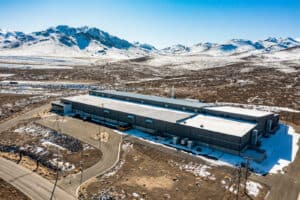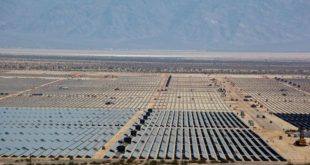The company is accelerating and expanding commercialization of its internally-developed, first-of-kind technologies in response to significantly increased demand for its products amongst rapidly growing domestic battery manufacturing industry
Reno, Nev., March 8, 2023 — American Battery Technology Company (ABTC) (OTCQX: ABML), an American critical battery materials company that is commercializing both its primary minerals manufacturing and secondary minerals lithium-ion battery recycling technologies, entered into agreements for the purchase of a move-in-ready, commercial-scale battery recycling facility located in the Tahoe-Reno Industrial Center (TRIC) at 2500 Peru Drive, McCarran, Nevada, to expand operations of its first-of-kind lithium-ion battery recycling technologies.
The demand for domestically produced and sustainably sourced battery metals has grown at a near insatiable rate over recent years, as the domestic manufacturing capacity of lithium-ion batteries has grown exponentially from less than 50 GWh/year to now over 700 GWh/year of operational and announced capacity. This rapid growth in demand has been further amplified with the passage of the Inflation Reduction Act (IRA) in the Fall of 2022, which includes mechanisms to incentivize electric vehicle manufacturers and consumers to purchase electric vehicles (EVs) that source battery metals from domestic manufacturers.
In response to this dramatically increased demand for its recycled products from domestic automotive and battery OEMs, ABTC has entered into agreements to purchase a move-in ready, commercial-scale battery recycling facility, that will allow the company to rapidly implement its internally-developed lithium-ion battery recycling technologies at significantly higher capacity than previously planned. This approximately 137,000 square foot facility is currently vacant and was previously used for the recycling of lead-acid batteries, and as such is already designed and permitted for similar operations. While all of the legacy processing equipment has been removed, the facility is already equipped with the necessary infrastructure equipment including the electrical distribution, HVAC, compressed air, nitrogen, water treatment, material handling, analytical quality control, and operational control rooms necessary to implement ABTC’s internally-developed lithium-ion battery recycling technologies.
“We are excited to be able to capitalize on this opportunity to accelerate the first commercial-scale implementation of our integrated lithium-ion battery recycling technologies,” stated ABTC CEO Ryan Melsert. “The purchase of this existing facility was significantly lower cost than constructing a new facility of similar design, and the fact that it is move-in ready with the necessary infrastructure equipment already installed will allow us to accelerate our start of commercial-scale operations.”
For the last several years, ABTC has been validating and optimizing its first-of-kind battery recycling technologies for the low-cost and low environmental impact recovery of critical battery materials from defective and end-of-life batteries, and the refining of these battery materials to meet battery grade material specifications for reintroduction into the domestic supply chain to enable a closed loop circular economy. In 2019, ABTC detailed the operations of this integrated battery recycling system in a global competition hosted by BASF, and was subsequently selected as the sole winner of the battery recycling portion of the Circularity Challenge. In 2021, ABTC was then awarded a $2M battery recycling grant through the U.S. Advanced Battery Consortium (USABC), which is comprised of the US Department of Energy, General Motors, Ford, and Stellantis, for a commercial-scale project currently underway to demonstrate that recycled battery metal products from domestic U.S. resources can be produced at lower cost than, and at significantly improved social and environmental impact, than conventionally mined virgin minerals.
Most recently in November 2022, ABTC was selected for a competitive U.S. DOE grant for a $20M project to develop and commercialize a set of Next Generation battery recycling technologies to even further enhance the recovery of recycled products and reduce the cost of operations. ABTC is currently completing construction of its Global Development Center in Fernley, Nevada, where it will develop and validate these next generation battery recycling technologies at the bench scale, optimize them in pilot scale operations, and then construct and operate commercial-scale systems of these technologies to further improve the performance of its integrated battery recycling operations.
 Alternative Energy HQ solar power for homes, wind energy, and bio fuel issues
Alternative Energy HQ solar power for homes, wind energy, and bio fuel issues







